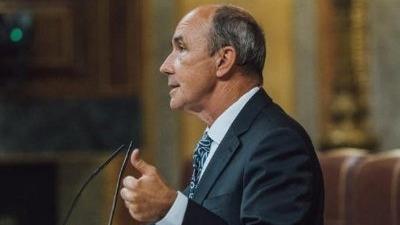Abortion hysteria over the baby's heartbeat
Castilla y León is the only autonomous community (region) in which PP and VOX govern in coalition. This is a model that many consider the only viable alternative to the Left - something which seems increasingly difficult due to the surrender of the Popular Party to Agenda 2030 and all the leftist ideology. On Thursday 12 January, the vice-president of the Junta de Castilla y León, Juan García-Gallardo from VOX, gave a press conference with Carlos Fernández Carriedo from the PP, in which the regional government's agreements were announced. Among these agreements, García-Gallardo announced "pro-life measures to try to ensure that mothers who want to continue with their pregnancies can continue and have all the support they need". In Castilla y León, there were 2,597 abortions in 2021 (in Spain, a country plunged into a serious demographic crisis, there are 90. 000 abortions a year). In the words of García-Gallardo, those 2,597 abortions were "a failure", and because of them, the following measures had been agreed: psychosocial care for mothers who need it; offering parents the possibility of listening to the baby's heartbeat so that before making a decision the mother can listen to the heartbeat of her child; promoting access to 4D ultrasound scans so that a video of the child in the womb can be seen in real time; respecting the fundamental right of health professionals to exercise conscientious objection to abortion. According to what has been agreed, health professionals will have to offer the first three measures to any pregnant woman who goes to the doctor, and then the woman will decide whether she wants them or not. "If they are useful in saving just one life, it will be worth it," García-Gallardo concluded.
The hysterical reaction from the Left was not long in coming. For the Socialist Party, these measures are "macho violence against women" and an "aberration". Podemos described it as an "atrocity" and "institutional violence". They even favoured the application of article 155, which allows the central government to control any autonomous region, to Castilla y León. Such an exaggerated reaction was, after all, to be expected from supporters of the culture of death, for whom abortion is a "human right" and therefore should have no limitations. But what was really worrying was the reaction of the Popular Party. On Friday the 13th, the councillor of the regional Presidency, Jesús Julio Carnero, stressed that "these are not obligatory measures for health workers", that is to say, the woman will not be offered the possibility of hearing the heartbeat of her child. According to the regional Health Departament: "Neither will a doctor be obliged to offer it, nor will any woman who wants to have an abortion have to listen to the heartbeat". The reaction from the national PP leadership has also been one of rejection. Its president, Alberto Núñez Feijóo, guaranteed that "the protocol will not be modified" in Castilla y León because it would mean "coercing the woman who wants to have an abortion" - although he assured that the PP is in favour of life.
This curious way of defending life has resulted in the PP's support in the Senate for an amendment to the future abortion law to be approved in February. The amendment prohibits "altering, whether to secure, revoke or delay" the will of a woman requesting an abortion. If the law is passed, measures such as those proposed by VOX could not be applied at a regional level. Also in February, and after more than 12 years, we are to expect the decision of the Constitutional Court on the appeal that 71 PP MPs filed against the abortion law in June 2010. It is expected that the recently renewed Constitutional Court, with a progressive majority, will dismiss the appeal. In this context, it is important to remember that in these twelve years, the PP has governed twice, once with an absolute majority, and that the Constitutional Court has had a conservative majority, i.e. of members proposed by the PP – and they did absolutely nothing. What happened in Castilla y León shows the reluctance of the PP to confront the ideological moves of the Left and explains why many of its leaders would prefer to govern with the support of the Left rather than with VOX.
Jihadist violence in Algeciras
On 25 January, Yassine Kanjaa, a Moroccan citizen who entered Spain illegally and who has had an expulsion file open since June 2022 (according to the Spanish Interior Ministry, he could not be expelled due to lack of Moroccan cooperation; according to Morocco, Spain did not process any application), attacked the parsonages of La Palma and San Isidro in Algeciras (Cádiz) with a machete, shouting "death to Christians" and "Allah is great". Diego Valencia, sacristan of La Palma, was stabbed to death, while Antonio Rodríguez, the parish priest of San Isidro, and three other people were injured.
The president of VOX, Santiago Abascal, was the harshest in condemning the attack: "Some open the doors for them, others finance them and the people suffer them. We cannot tolerate Islamism advancing on our soil". Both the president of the government, Pedro Sánchez, and Alberto Núñez Feijóo, lamented the death of the deceased sacristan ("deceased" not "murdered").Yet later, the PP leader generated controversy when he stated that "for many centuries you have not seen a Catholic or a Christian kill in the name of their religion, but there are other peoples who have some citizens who do so". Faced with criticism from the Left and the media, Feijóo apologised a few days later, pointing out that these had not been his "best statements" and that "religions are not guilty of anything. It is not a problem of religion but of fanaticism. Neither Muslims nor Catholics are guilty". This same argument, but adding the alleged violence of Catholics, was used by the extreme left and by some media which, in addition to attacking VOX for "wanting to use crime", presented a totally distorted picture of reality. No central government representative attended the funeral of Diego Valencia. The bishop of Cádiz, Rafael Zornoza, pointed out that the sacristan died "for his faith and remembering his faith".
Portugal: CHEGA rises in the polls as the government continues to add corruption cases
Continuing corruption scandals and resignations in the Portuguese government led to a motion of censure in the parliament on 5 January. However, only the Liberal Initiative and CHEGA voted in favour of the motion, the liberal right of the PSD abstained and the entire Left voted against it. Hours after the failure of the motion, a new scandal erupted with the resignation of Carla Alves, Secretary of State for Agriculture, who was forced to leave her post 26 hours after her appointment due to a corruption case involving her husband. The next to fall from grace was Hugo Pires, the new Secretary of State for the Environment. He reportedly sold his company to a group dedicated to the import and treatment of waste and materials considered hazardous to health and the environment. On 10 January, Pedro Miguel Magalhães Ribeiro, an adviser to the Prime Minister's office, who had been convicted in court proceedings for violating the obligations of neutrality and impartiality during the 2021 election campaign while mayor of Catarxo, resigned. Corruption is becoming the Achilles heel of the socialist government.
As expected, and for the third time, Portugal's Constitutional Court on 30 January rejected the new euthanasia law on the grounds that some points of that law conflicted with the country's fundamental law. According to the president of the Constitutional Court, João Pedro Caupers, the decision was taken by a majority, considering that the law gives rise to contradictory interpretations. This is another victory for Portugal's conservative President Marcelo Rebelo de Sousa, who called for a review of the law as a matter of "legal certainty".
The Constitutional Court's decision was warmly welcomed by the CHEGA party, which held its fifth National Convention in Santarém. At the Convention, André Ventura was re-elected party leader with 98.3 per cent of the votes. In the speech after his election, Ventura promised to "conquer the street for the left" and give a voice to those who have lost it: "There is only one entity that establishes the red lines. It is not called Luís Montenegro, nor Rui Rocha, nor Augusto Santos Silva, nor António Costa. It is called the Portuguese people and it alone will establish the red lines of Portugal and CHEGA".
The Convention was closed by the leaders of several European parties, mostly from the Identity and Democracy group, who attended the event. Among them were Jordan Bardella, Marine Le Pen's successor as head of Rassemblement National, Tino Chrupalla from Alternative for Germany (AfD), Geert Wilders from the Dutch Party for Freedom (PVV), Tom Van Grieken from the Vlaams Belang (VB), Ludovit Goga from the Slovak movement Sme Rodina (We are Family), Cláudiu Tarziu from the Alliance for the Union of Romanians (AUR) and Adam Samu Balázs from Fidesz (Hungary). The representative of VOX, Rocío Monasterio, president of VOX in the Community of Madrid Representing VOX, stressed the importance of this type of meetings: "We patriots will be protagonists and will play a key part in the necessary change of course of our nations. This is why it is essential to join forces and strengthen our ties so that our ideas become a reality".
CHEGA's stiff opposition to the socialist government is increasing the popularity of André Ventura's party. According to the latest polls, CHEGA has reached 14.2 per cent of the votes, rising from 12 to 32 seats. Based on these polls, if there were elections in Portugal tomorrow, CHEGA and the PSD would have 44.8% of the votes and would be able to form a government.
Read also
Francisco José Contreras: “The renewal of the West is the historic task that the New Right must take on”
Francisco José Contreras is Professor of Philosophy of Law at the University of Seville and was a deputy for VOX during the last legislature (November 2019-July 2023).
Álvaro Peñas
Country Report: Spain & Portugal, February 2023
Spain’s parliament continues to opt for the most radical progressive agenda, and the month of February saw a modification of the abortion law, an approval of the trans law and the first step towards the animal rights law, or animal dignity law, which must be still ratified in the Senate.
Álvaro Peñas
The divine fool
On 2 May 1808, while blood was still being shed in the streets of Madrid, Napoleon dined in Bayonne with the “kings” of Spain, Charles IV and his son Ferdinand VII.
Álvaro Peñas
Kursk: Putin’s Achilles heel?
The operation by Ukrainian forces in the Kursk region of Russia has been one of the most unexpected actions since the Russian invasion began in February and has so far drastically changed the map of a war that had been slowly changing since the recapture of Kherson and much of the Kharkov region.










Comments (0)